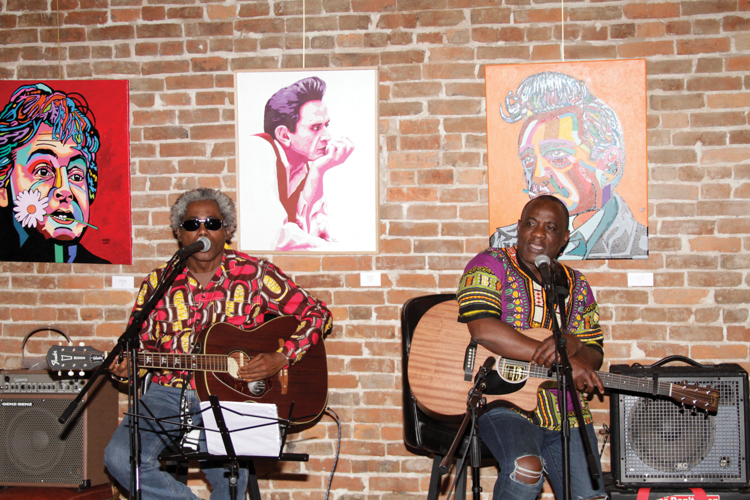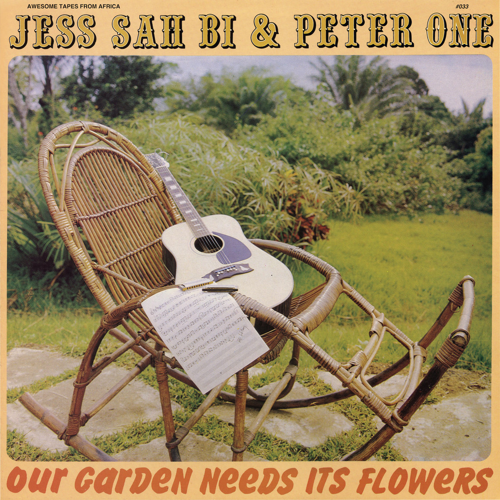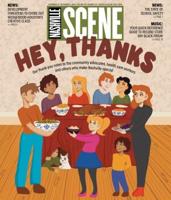
“We didn’t know nobody from Nashville, to tell you the truth,” is how Peter One begins to tell me about his relationship to American music, which informs the recently reissued record he made three decades ago. It was recorded in the big city of Abidjan, in Ivory Coast, the West African country of his birth. Peter One is speaking to the Scene from his home in Nashville, where he’s lived since 2013. “The only country musicians we knew about was Don Williams, and also Kenny Rogers. We became very familiar with [other country musicians] after 1985.”
It was early in 1985 that Peter One joined fellow Ivory Coast native Jess Sah Bi, currently a San Francisco resident, at Abidjan’s JBZ Recording Studio. The record they cut there with a group of musicians drawn from Ivory Coast and its neighboring countries, Our Garden Needs Its Flowers, turned the harmony-singing duo into stars who played Ivory Coast’s largest venues. Today their music floats in international pop space, echoing late-’60s folk-rock and ’70s country while remaining attached to local musical practices. After surviving a series of political and cultural twists and turns, Jess Sah Bi and Peter One’s modest masterpiece is finally being reissued with the loving care it’s long merited, and the duo is currently playing a series of dates that includes a stop on Saturday night at The Basement, organized by local arts nonprofit FMRL.
Our Garden Needs Its Flowers is 30 minutes of exquisite music, but it hasn’t been available in the United States in an authorized edition until now. The Los Angeles label Awesome Tapes From Africa has reissued the album with the cooperation of Peter One and Jess Sah Bi. For label head Brian Shimkovitz, a 37-year-old Chicago native who studied ethnomusicology and used a Fulbright Scholarship grant to spend a year researching music in Ghana, the record is a triumph of internationalist art. Our Garden evokes both Kenny Rogers and Simon & Garfunkel, but it is redolent of a vanished era in Ivory Coast history.
“During that time, people in Abidjan had access to a whole spectrum of popular culture from all over the world,” Shimkovitz says. “It was a very connected place and a very financially successful place, and a cosmopolitan place among West African cities. These guys were connected, educated, active people in society. They were doing their own thing.”
Talking to Peter One, who is 62, I get the sense of a vigorous, connected intellect. Born in Bonoua, Ivory Coast, he moved to Abidjan in the late ’70s to attend the University of Abidjan. Hanging out and playing guitar in his dorm, he made a connection with fellow guitarist and singer Jess Sah Bi, an accomplished performer who had been appearing on television and radio since he was a teenager. Influenced by the harmony singing of Simon & Garfunkel and Crosby, Stills & Nash, the young musicians began a performing and songwriting partnership that would lead them to pop success throughout West Africa.
For Jess Sah Bi, who is one year younger than Peter One, the new reissue and their current spate of live shows — when we spoke, they had recently returned from dates in Washington, D.C., and Baltimore — validates the concept he helped devise in the early ’80s. Back then, folk-rock was becoming popular among Ivory Coast students and pop music fans.
“It was like music from my tribe,” Jess Sah Bi says about the Anglo-American folk-rock he absorbed in the ’70s. Like Peter One, he is a member of the Gouro tribe. Jess Sah Bi was born in the Ivory Coast city of Sinfra and moved to Abidjan when he was a teenager. “I like the way they sing; I like the way they do,” he continues. “It’s where I got my aspiration, and this happened that what we were doing was similar to Simon & Garfunkel, something like that.”
Both men tell me about their love for country music and Creedence Clearwater Revival. The post-Don Williams sound they got on Our Garden is remarkable, and owes a debt to the international pop they heard on records and radio. Still, their story is partly about the effect of local political and social pressures on music and musicians.

Peter One left Ivory Coast in 1995, traveling first to New York and Delaware before coming to Nashville in 2013 to take a nursing job. He remembers how the mood of his native country began to change in the years before he moved away.
“It was definitely the political situation that led me out,” he says. “Starting from the early ’90s, the political situation was getting really nasty and unstable. I could foresee the trouble coming. I didn’t want to stay there and shut my mouth.” He’s referring to a period of economic crisis in the once-prosperous Ivory Coast that began with a 1981 recession and continued to a devaluation of the country’s currency in 1994. The country’s social fabric came apart, and after President Félix Houphouët-Boigny died in 1993, the pan-African aims of his government were challenged by the rise of xenophobia and nationalist fervor.
Meanwhile, Jess Sah Bi is circumspect about the forces that impelled him to leave the country in 1996. During his time in Ivory Coast, he enjoyed a second career as the country’s first political cartoonist. Like Peter One, he observed the changes occurring in his country, but these days he prefers to keep the past at a distance.
“Since then I don’t wanna talk about it,” Jess Sah Bi says about Ivory Coast’s political status. “It’s a little complicated. I’m a cartoonist, and I used to do political things. But for some reason, I don’t want to talk about politics.” I understand his sentiments, and we talk about how Our Garden Needs Its Flowers came to fruition.
“We met our producer [Etienne Theo] at a gas station,” Jess Sah Bi tells me. “And he approached us and said, ‘Oh, what’s up, guys? How y’all doin’? You got a project to do?’ And at that time we were looking for a producer. He said, ‘Come by the house one day.’ We came to the house, and he said, ‘OK, I want to produce your album.’ ”
Peter One and Jess Sah Bi entered JBZ Recording Studio, which was owned by French engineer and producer Jacques Bizollon, in early 1985 along with a crew of musicians that included guitarist and arranger N’Guessan Santa. Santa’s playing gives savor to Our Garden and the duo’s equally fine 1987 follow-up, Spirit in 9. (Santa died in Abidjan in August 2018 after a long, distinguished career.)
Awesome Tapes’ reissue of Our Garden is sourced from a vinyl LP. Jess Sah Bi tells me he has recently spoken to Theo about the master tape, whose whereabouts seem to be in question at the moment. Shimkovitz and the label have done a superb job of remastering Our Garden, which was recorded under what Peter One describes as good conditions at JBZ.
“It was an eight-track studio,” Peter One says. “At that time it was one of the best ones in Abidjan. Compared to what we could find in Europe and other big countries, it was really average. The musicians, all of them are African and most of them Ivorian, from the Ivory Coast, and one from Cameroon, the bass player. The musicians got the feeling very quickly.”
Our Garden is a record of deep feeling and subtle pleasures. Santa’s guitar work helps turn the record’s “Kango” and “Apartheid” into quasi-country with backbone and bite, and the duo sings beautifully. The Byrds themselves would approve of how Peter One and Jess Sah Bi abstracted and recast American folk-rock in the title track, which is five of the finest minutes of pop you’ll hear in 2018.
With the help of Shimkovitz, who tells me he’s communicated with a record label that had released a sonically inferior version of the album without their consent, the duo is finally set to achieve the global stardom they deserve. “The label tried to challenge us when we started to release it,” Shimkovitz says, “but we were able to override them because we’re actually working with the artists, and we are also working with the knowledge of the original producer.”
For both Jess Sah Bi, who says he’s thriving in California, and Peter One, who tells me he’s recording new tracks in Nashville, the possibilities remain open. Still, Peter One says certain small problems of human interaction remain even in the most welcoming of places.
“When I first came [to Nashville], I tried to meet people and get connected with musicians, but it didn’t work,” he says. “People are doing this for fun, for one thing, but sometimes they look at me like it’s strange — you know, an African talking about country music.”






